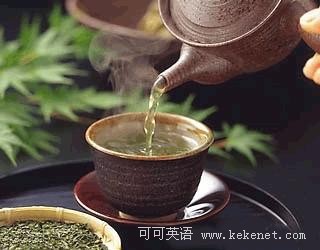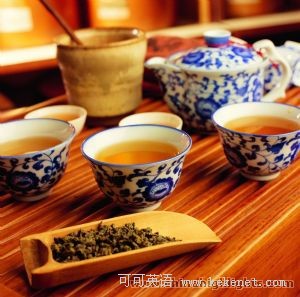(单词翻译:单击)
对话1
Zhao: in China at least, coffee is often associated with an exotic, well-to-do bourgeois lifestyle. Coffee is often considered a hobby of the well-educated, middle-class people.
在中国,说起咖啡,人们往往会想到异国情调,小资的优越生活方式.喝咖啡通常被认为是有修养的中产阶级的习惯.
Tony: maybe that's why some young chaps often spend a whole afternoon in a coffee bar, surfing the net or just typewriting something with laptop. While they are savoring a coffee at a leisured pace, they are actually showing off!
也许,这便是有些年轻人动不动就花一整个下午泡在咖啡吧,摆开笔记本电脑,上上网,或者只是打打文件的原因吧.他们悠闲地品着咖啡,其实也是在炫耀自己.
Z: yes. Behind a lifestyle, there is a culture. Young people easily become blind worshippers of a Westernized life. While they may not really life coffee, they think it desirable and enviable to be lavish with money in those high-consumption places.
嗯.生活方式背后就是文化.年轻人很容易就迷信西式生活.他们也一定喜欢咖啡,但坚信,在那些高消费场所花钱至少令人羡慕.
T: then what about tea? We need to bear in mind in the first place that tea, rather than coffee, has been the most popular drink for the Chinese people.
那你说喝茶怎么样?要知道,中国人最喜欢的饮料不是咖啡,而是茶.
Z: well. Tea reprements another facet of popular culture. While a coffee bar is usually quiet and resonates with soft, elegant music, a teahouse is often a noisy, crowded, public space. People visit teahouses to associate with others, playing chess, chatting, or simply listening to operas.
嗯,茶大概是代表了大众文化的另一个侧面.咖啡吧是那种安静,高雅,余音缭绕的地方,茶馆则往往是嘈杂,拥挤的公共空间.人们去茶馆是想跟人说说话,下下棋,或者只是听听戏.
T: what a pity that the traditional teahouses, as depicted Lao She, keep fading away so quickly in this metroplis. It is not easy to find an old-fashioned teahouse that suits the ordinary people's spending power either. Teahouses of today all feature a cozy, comfortable environment, and high-quality services, but can easily cost you a good deal—just like a coffee bar.
可惜啊,在北京这个大都市,老舍笔下那种传统茶馆正在迅速地销声匿迹.普通人去的起的那种老茶馆再也难找到了.如今的茶馆都是那种舒适,惬意的环境,还有高档的服务,但是太贵了,跟咖啡厅几乎不相上下.
Z: well, that's true. In a sense, it is not so much what you drink that really counts, as where and how you drink.
这是实话,在某种意义上,重要的仿佛不再是喝什么了,而是在哪儿喝,怎么喝.
生词集锦
bourgeois: belonging to the middle class 中产阶级的
a traditional bourgeois family 一个传统的中产阶级家庭
well-to-do: having a lot of money; rich 有钱的;富有的;富裕的
a well-to-do family 富裕家庭
They're very well-to-do. 他们很阔绰.
Savor: to enjoy the full taste or flavour of something, especially by eating or drinking it slowly 品味;细品;享用
He ate his meal slowly, savoring every mouthful. 他细嚼慢咽地吃着饭,一口一口地品味。
show off: to try to impress others by talking about your abilities, possessions, etc. 炫耀自己;卖弄自己
He's just showing off because that girl he likes is here. 他不过是在表现自己,因为他喜欢的那个姑娘在场。
Worshipper: a person who worships God or a god 崇拜上帝(或神)的人;做礼拜的人;敬神者;拜神者
regular worshippers at St Andrew's Church 经常到圣安德肋教堂做礼拜的人
sun worshippers lying on the beach 躺在海滩上晒太阳的人们 figurative
lavish: large in amount, or impressive, and usually costing a lot of money 大量的;给人印象深刻的;耗资巨大的
lavish gifts/costumes/celebrations 丰厚的礼品;昂贵的服装;规模盛大的庆典
They lived a very lavish lifestyle. 他们过着挥霍无度的生活.
Bear in mind: 记住
Bear in mind that you'll have to practice economy. 记住要厉行节约.
in the first place: used at the end of a sentence to talk about why something was done or whether it should have been done or not (用于句尾,谈论某事为何或是否应该做)究竟,到底,当初
I still don't understand why you chose that name in the first place. 我仍不明白,你究竟为什么取了这么个名字.
I should never have taken that job in the first place. 我当初就不该接受那份工作.
Resonate: (of a voice, an instrument, etc. 嗓音、乐器等) to make a deep, clear sound that continues for a long time 产生共鸣;发出回响;回荡
Her voice resonated through the theatre. 她的声音在剧院里回荡。
Depict: to describe something in words, or give an impression of something in words or with a picture 描写;描述;刻画
The novel depicts French society in the 1930s. 这部小说描述了 20 世纪 30 年代的法国社会。
The advertisements depict smoking as glamorous and attractive. 这些广告把吸烟描绘得充满刺激和富有吸引力。
Fade away: 逐渐减弱,逐渐消失
Memories of my sister faded away after many years.
过了多年以后,对我姐姐的记忆渐渐淡化了.
In a sense: 就某种意义来说
You are right in a sense. 就某种意义来说你是对的。
对话2
G: does tea-serving follow any special etiquette in China? Each time I dropped in at my Chinese frineds' homes, their parents would offer me a cup of hot, strong tea, though they never inquired of me about whether I want it.
在中国,给人上茶有什么特别的礼节没有?每次我上朋友家串门,他们总是给我泡上一杯热腾腾的浓茶,可是他们从来也不问我需不需要.
Z: you've got the point there. It is a custom and good manners to serve tea to a guest who comes to pay a visit. There is no need to ask if he needs it or not, or if he wants something else. It might be an insult to the guest if he is left sitting there without being served tea.
你说到点子上了.给上门拜访的客人上茶确实是风俗礼节,不需要问他们要不要茶,或者要不要别的东西.要是把客人冷落在一边,连茶都不端一杯,会被认为是在侮辱人家的.
G: so the guest is presumed to be thirsty and in need of some drink after the trip. In that case, I guess, in return, the guest doesn't have to drink it if he wouldn't like it.
这么说来,我们就得客人赶路后,口渴了,需要喝点什么.那样的话,我想,客人如果不喜欢茶,也可以不喝它吧?
Z: it wouldn't be considered rude behavior if he doesn't even take a single drop. But he'd better receive the teacup with both hands and bow his thanks when the cup is brought before his face. When the host pours hot water into his cup, he may also choose to tap his index finger on the table, meaning "Thanks". No matter if he likes it or not, it is impolite if he doesn't even lay a finger on the cup.
如果一滴都不喝,确实也算不上无礼.但是茶端到他面前时,他最好双手接住茶杯,欠身致谢.主人给他倒茶时,他也可以在桌面上轻叩下食指,表示”叩首谢谢”.不管他喜不喜欢,要是连碰都不碰一下茶杯,那就有失礼貌了.
G: so next time, I'd better take a few sips, to 'save face' at least, right?
所以,下次我还是喝几口,”给面子”,对吧?
Z: sure. The guest is welcomed by being served tea. But if after chatting for a while, the host asks servants or family memners to serve a new cup of tea, or add some hot water, he is giving another signal.
当然啦.上茶是表示欢迎.但是,如果聊了一会儿后,主人叫仆人或者家人重新给你沏茶,或者加点开水,他的意思可就变了.
G: what does that imply, then?
那他是想说什么呢?
Z: more often than not, the understatement is 'I'm afraid it's time you leave'.
很可能是,”不早了,你是不是该走了啊?”
词汇集锦
Etiquette: the formal rules of correct or polite behaviour in society or among members of a particular profession (社会或行业中的)礼节,礼仪,规矩
advice on etiquette 在礼节方面的忠告
medical/legal/professional etiquette 医学界的/法律界的/行业规矩
drop by/in/round; drop in on somebody; drop into something: to pay an informal visit to a person or a place 顺便访问;顺便进入
Drop by sometime. 有空儿来坐坐。
I thought I'd drop in on you while I was passing. 我曾想路过时顺便来看看你。
Sorry we're late─we dropped into the pub on the way. 对不起,我们迟到了--我们半路上顺便到酒馆坐了坐。
Insult: a remark or an action that is said or done in order to offend somebody 辱骂;侮辱;冒犯~ (to sb/sth)
The crowd were shouting insults at the police. 群众大声辱骂着警察。
His comments were seen as an insult to the president. 他的评论被看成是对主席的冒犯。
The questions were an insult to our intelligence(= too easy). 那些问题(简单得)有辱我们的智慧。
Sip: a very small amount of a drink that you take into your mouth 一小口(饮料)
to have/take a sip of water 喝一小口水
understatement
1.a statement that makes something seem less important, impressive, serious, etc. than it really is 保守的说法;不充分的叙述
To say we were pleased is an understatement(= we were extremely pleased). 只说我们高兴真是轻描淡写。
‘These figures are a bit disappointing.’ ‘That's got to be the understatement of the year.’ “这些数字有点令人失望。” “那一定是本年度最保守的说法了。”
2.the practice of making things seem less impressive, important, serious, etc. than they really are 淡化;低调说法
typical English understatement 典型的英国式低调说法
He always goes for subtlety and understatement in his movies. 他总是在自己的电影中运用细腻刻画和淡化手法。


